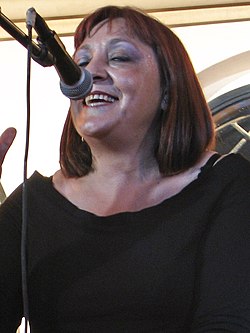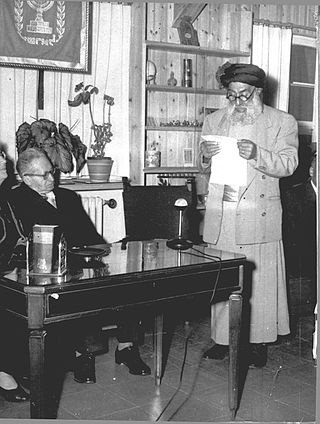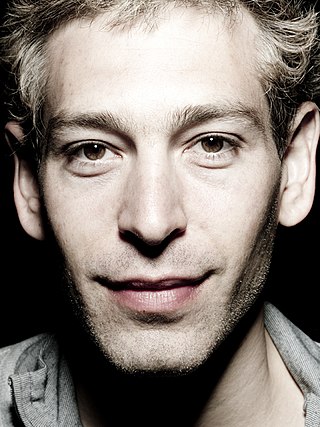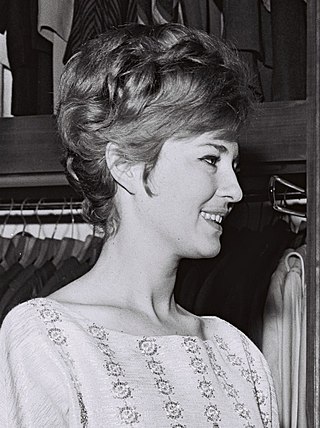
Ilana Eliya (born April 24, 1955 in Jerusalem) is an Israeli singer of Kurdish descent. [1]

Ilana Eliya (born April 24, 1955 in Jerusalem) is an Israeli singer of Kurdish descent. [1]
Ilana Eliya's family was originally from Iraqi Kurdistan and immigrated to Jerusalem shortly after the founding of Israel. In her childhood, she was heavily influenced by the musical and poetic career of her father. She heard Kurdish music Early on and became interested in music. [2]
As a teenager, there was no opportunity for her to do a music education in East Jerusalem. Therefore, her parents sent her to the YMCA, where she sang arias and studied scripture.
She was focussing on Jewish religious music at that time. Soon after, she began her studies in ethnology and became increasingly interested in her Kurdish roots. At the latest after the death of her father in 1988, her interest in Kurdish music intensified, which is led her to begin her musical career at the age of 37.
Ilana Eliya's style is a mixture of ethnic music, Kurdish folklore and Israeli world music. She often sings traditional Kurdish songs in a new way with some affect of Israeli music scene, and for this reason, her style has formed a special feature in Kurdish music. Because in the style of Eliya and her band, oriental and western styles flow into each other and Kurdish and Israeli musical influences can be recognized in her work. The latter is reminiscent of the old Jewish Ashkenazi community, which someday have been located around the mountain Ararat (today in the settlement area of the Kurds). [3]
In 1992 Eliya released her first solo album called "Jabaliyo" (from the Kurdish-Arabic word Cebel, which means "son of the mountains"). [4] The special feature of this album is that all songs were recorded accompanied by classical musical instruments and not reworked. Many of her recited songs are rooted in Kurdish folk music and are interpreted with her new style. [5] Eliya's songs include political messages such as freedom of Kurdistan and the emancipation of women, and still other songs are about love and joy of living, which are particularly evident through her voice and singing. [6]
The music of Israel is a combination of Jewish and non-Jewish music traditions that have come together over the course of a century to create a distinctive musical culture. For almost 150 years, musicians have sought original stylistic elements that would define the emerging national spirit. In addition to creating an Israeli style and sound, Israel's musicians have made significant contributions to classical, jazz, pop rock and other international music genres. Since the 1970s, there has been a flowering of musical diversity, with Israeli rock, folk and jazz musicians creating and performing extensively, both locally and abroad. Many of the world's top classical musicians are Israelis or Israeli expatriates. The works of Israeli classical composers have been performed by leading orchestras worldwide.

Kurdish music refers to music performed in the Kurdish languages and Zaza-Gorani languages. The earliest study of Kurdish music was initiated by the renowned Armenian priest and composer Komitas in 1903, when he published his work "Chansons kurdes transcrites par le pere Komitas" which consisted of twelve Kurdish melodies which he had collected. The Armenian Karapetê Xaço also preserved many traditional Kurdish melodies throughout the 20th century by recording and performing them. In 1909, Scholar Isya Joseph published the work "Yezidi works" in which he documented the musical practice of the Yazidis including the role of the musician-like qewal figures and the instruments used by the minority.

Zakho, also spelled Zaxo is a city in the Kurdistan Region, at the centre of the Zakho District of the Dohuk Governorate, located a few kilometers from the Ibrahim Khalil border crossing. Zakho is known for its celebrations of Newroz.

Yasmin Levy is a Ladino singer and song writer originating from Israel.

The Jews of Kurdistan are the Mizrahi Jewish communities from the geographic region of Kurdistan, roughly covering parts of northwestern Iran, northern Iraq, northeastern Syria and southeastern Turkey. Kurdish Jews lived as closed ethnic communities until they were expelled from Arab and Muslim states from the 1940s–1950s onward. The community largely spoke Judeo-Aramaic. As Kurdish Jews natively adhere to Judaism and originate from the Middle East, Mizrahi Hebrew is used for liturgy. Many Kurdish Jews, especially the ones who hail from Iraq, went through a Sephardic Jewish blending during the 18th century.
Asenath Barzani, was a Kurdish Jewish female rabbinical scholar and poet who lived near Duhok, Kurdistan.

Kurdish culture is a group of distinctive cultural traits practiced by Kurdish people. The Kurdish culture is a legacy from ancient peoples who shaped modern Kurds and their society.

Kurdish Mythology is the collective term for the beliefs and practices of the culturally, ethnically or linguistically related group of ancient peoples who inhabited the Kurdistan mountains of northwestern Zagros, northern Mesopotamia and southeastern Anatolia. This includes their Indo-European pagan religion prior to them converting to Islam, as well the local myths, legends and folklore that they produced after becoming Muslims.

Rabbi Uri Zohar was an Israeli film director, actor and comedian who left the entertainment world to become an orthodox rabbi.

Matthew Paul Miller, known by his stage name Matisyahu, is an American reggae singer, rapper, beatboxer, and musician.
Din Din Aviv is an Israeli pop and folk singer. After performing with Gaya and with the Idan Raichel Project, she released her debut album, Sodotay in 2006.

Riff Cohen is an Israeli singer-songwriter, actress, and musician who performs songs in Hebrew, French and Arabic.

Mordechai Zaken also Moti Zaken was a historian and the 2019 laureate of "the Prime Minister Prize for the research of the Jews of the Orient." He was an expert on the Kurds and Middle Eastern minorities both as academic – he was historian of the Jews, the Kurds in Kurdistan and as professional - serving as the advisor on Israeli Arabs and minorities to the prime minister, Benjamin Netanyahu (1997–1999), and to the Ministry of Public Security from 2001.

Kurdish Jews in Israel are immigrants and descendants of the immigrants of the Kurdish Jewish communities, who now reside within the state of Israel. They number between 150,000 and 300,000.

Idan Raichel is an Israeli singer-songwriter and musician known for his "Idan Raichel Project", distinctive for its fusion of electronics, traditional Hebrew texts, and diverse musical influences. Prior to the project, Raichel was a keyboardist, collaborating with artists such as Ivri Lider.
Basya Schechter is an American singer-songwriter, multi-instrumentalist, composer, producer, cantor, and music teacher. She is the lead singer and founder of the world/folk rock band Pharaoh's Daughter and has released two solo albums. She has also collaborated with the groups Darshan and The Epichorus.

Kurds in Israel refers to people of Kurdish origin residing in Israel. The Kurdish population in Israel is small and is mainly composed of individuals and families, who fled Iraq and Turkey during the Iraqi–Kurdish and the Kurdish–Turkish conflicts during the 20th century, as well as temporal residents arriving in Israel for medical care.

Noa Kirel is an Israeli singer-songwriter, actress, model, television host, and a reality television program judge in Israel's Got Talent. She has won five MTV Europe Music Awards for Best Israeli Act from 2017 to 2022. She represented Israel in the Eurovision Song Contest 2023 with the song "Unicorn", finishing in 3rd place.

Bracha Zefira was a pioneering Israeli folk singer, songwriter, musicologist, and actress of Yemenite Jewish origin. She is credited with bringing Yemenite and other Middle Eastern Jewish music into the mix of ethnic music in Palestine to create a new "Israeli style", and opening the way for other Yemenite singers to succeed on the Israeli music scene. Her repertoire, which she estimated at more than 400 songs, included Yemenite, Bukharan, Persian, Ladino, and North African Jewish folk songs, and Arabic and Bedouin folk songs and melodies.

Ilana Rovina was an Israeli singer.